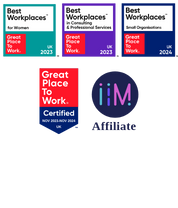Senior Professionals: Bouncing back after redundancy
Being made redundant after spending years or even decades climbing up the career ladder can be an overwhelming and terrifying prospect. Unfortunately, it’s one that has become a harsh reality for many senior-level professionals this year.
Not only can redundancy feel like someone has hit pause on your career goals and progression, but it can also have a significant impact on your mental health, your finances and your family life. Naturally, you’ll want to make your job hunting efforts as quick and painless as possible to help you to regain a sense of normality.
However, if you’ve been out of the job-hunting game for a while and feel a little rusty when it comes to CVs and interviews, it can be difficult to know exactly how to get started. Add on the pressure of competing against thousands of other senior-level professionals for only a handful of roles and this can seem like an even bigger mountain to climb.
Thankfully, we’re here to give you some helpful advice to help you build your confidence and bounce back from redundancy as quickly as possible.

Find your career direction
While being made redundant is a stressful and upsetting experience, it can also offer a unique opportunity to take stock of what you want from your career moving forward. Perhaps you’ve previously been interested in moving to another sector or maybe you feel ready to strive for a higher-level position or to pursue a career as a contractor. There’s also nothing wrong with wanting to find a similar role, within the same sector as you had previously.
Establishing what direction you’d like to take your career isn’t always straightforward and it can be worthwhile to talk it through with someone before taking action. While talking to family can be beneficial, it can also be worthwhile to approach your professional network or to enlist the help of an outplacement service to help you evaluate what your next step should be.
Revitalise your CV
If it’s been years since you’ve even thought about your CV, chances are it will be outdated and in need of a serious face-lift. We all know the importance of including our most recent work experience and technical or soft skills, but you should also do some research into suitable designs and structure to ensure its suitable for the industry you’re applying for. The last thing you want is to not be considered because your CV isn't structured correctly or looks old fashioned. It's also important to that your CV and LinkedIn profile correlate because recruiters will undoubtedly check your profile as part of their screening process.
With so much experience under your belt, try to only focus on your most recent positions and keep your responsibilities to just a few lines. Nobody has time to read a CV that is countless pages long, no matter how interesting their work history is. Also, take the time to tailor your CV to each job you apply for. You can do this by matching your experience and skillset to relevant keywords and common-phrases used in job ads and descriptions. If you’re really at a loss, ask a recruiter or an outplacement service to review and feedback on your CV for some helpful pointers.
Utilise your network
As a senior-level professional, you’ll undoubtedly have a little black book jam-packed with professional connections you’d made throughout your career. From recruiters to project managers to directors, if there was ever a time to reach out to these contacts for advice and support, it’s now. Word of mouth and personal connections can be an effective way of finding out about roles that aren’t being advertised online yet.
Rather than just ringing people up out of the blue and putting them on the spot, send a friendly email to see if you can arrange a time for a video call or invite them for a coffee to catch-up instead.
In addition to hearing about new roles, networking with people from within your industry or who share the same profession can also be a fantastic way to keep your knowledge of market trends, challenges and news up to date. So sign up and attend regular networking events for senior professionals, you never know what you might learn or who you might meet.
Prepare for questioning
When you inevitably get invited for an interview with a prospective employer, it's likely that you will be asked about your previous role and your reason for leaving. Remember that being made redundant is nothing to be ashamed of and many people are in exactly the same boat as you are right now. Consider your response to this question, write it down and memorise it so that you sound natural and confident when your interview comes around. As hard as it might be, try to refrain from speaking ill of your past employer and instead focus on the positives that have come from your redundancy.
By applying our advice to your programme, change or project management job hunting efforts, you’ll get off those starting blocks in a flash, beat your competition and continue on a clear and strong trajectory towards your next role. With your broad work history and fantastic skillset, we've got every confidence that you'll be back on your feet in no time.
2nd April
Career Advice
Related insight
Related News
Looking to
transform?
Quicklinks

Address
Deltra Group
52-54 Gracechurch St
London
EC3V 0EH
Contact
+44 (0)207 375 9500
info@deltragroup.com




